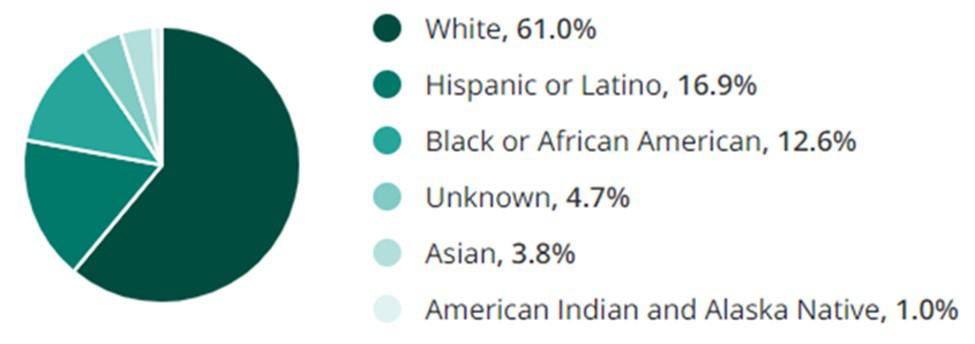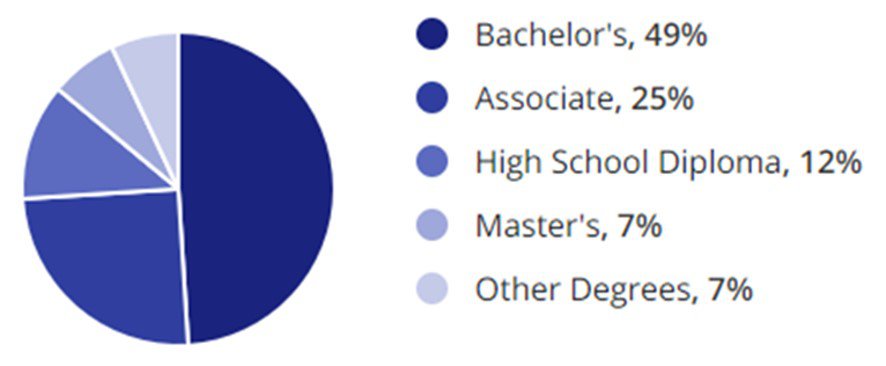Welcome to your ultimate guide for navigating law enforcement careers. Whether you’re taking the first steps on this path or aiming to advance within the sector, understanding the landscape of law enforcement jobs is critical. This field offers more than just a job; it opens doorways to impactful service in communities, opportunities for personal growth, and fulfilling challenges.
In this guide, we’ll cover the essentials – from educational requirements and areas of expertise to salary trends, hiring prospects, and the most in-demand skills. We’ll also closely examine the demographics defining law enforcement’s current diversity and inclusion workforce today.
This guide is your starting block for making a difference and the unique challenges law enforcement presents. With dedicated sections on current and future job outlooks, frequently asked questions, and additional resources, you’ll find everything you need to embark on or advance your career. So, let’s explore what a law enforcement career could look like for you and how you can prepare to serve and protect within one of the most rewarding fields.
Educational Requirements
A career in law enforcement starts with a solid educational foundation. Most entry-level law enforcement jobs require a high school diploma. However, if you’re aiming for a specialized role or have sights on rapid advancement, you’ll likely need further education. An associate or bachelor’s degree in criminal justice, criminology, or related fields can set you apart. These programs cover essential topics like criminal law, ethics, and investigative procedures, equipping you with knowledge directly applicable to daily duties.
Beyond degrees, certifications in areas like forensic analysis or cybercrime can boost your credentials. Continuous training is also given in this sector. Whether staying updated on the latest legal changes or learning new technology, ongoing education is critical for success in law enforcement careers.
Areas of Expertise
Law enforcement careers span many specialization areas, each demanding a unique skill set and focus. Here’s a brief overview of some critical areas:
- Patrol Officers: These professionals are the backbone of local police departments, ensuring public safety and order through regular patrols and emergency response.
- Detectives: Specializing in investigations, detectives gather facts, analyze evidence, and solve crimes. Their work is crucial in bringing justice to victims.
- State Troopers: Also known as highway patrol officers, they enforce motor vehicle laws and provide assistance during state-level emergencies and disasters.
- Federal Agents: Working for agencies like the FBI or DEA, federal agents address crimes that cross state lines and involve federal law. Their roles are diverse, from counterterrorism to drug enforcement.
- Correctional Officers: These officers manage detention facilities, ensuring the security and welfare of inmates awaiting trial or serving sentences.
Choosing the right area of expertise in law enforcement depends on your interests, skills, and career aspirations. With a broad range of specialties, the field offers opportunities to protect and serve in numerous capacities. If you’re considering a role that demands specialized training or education, researching the specifics of these areas can help you invest your time wisely.
Demographics in the United States
Ethnicity/Race:
The landscape of law enforcement is diverse, reflecting the multifaceted nature of the communities they serve. The demographic breakdown in the U.S. shows a mix of ethnicities and races. Approximately 61% were White, 16.9% Hispanic or Latino, 12.6% Black or African American, 4.7% of unknown ethnicity, 3.8% Asian, 1% Native American and Alaska Native. Efforts are ongoing to enhance representation from various backgrounds, which is essential for fostering trust and understanding within all community sectors.

Gender:
The gender composition within the law enforcement workforce is evolving. Currently, the distribution stands at 76.3% male and 23.7% female. There’s a push to balance this ratio, recognizing the unique insights and capabilities women bring to policing and investigation roles. Initiatives to attract and support more female professionals in law enforcement are gaining momentum.

Age:
Age diversity is another characteristic of law enforcement personnel, ranging from young recruits to seasoned veterans. The average age of officers is over 40 years, blending the energetic approach of newer members with the deep experience and wisdom of long-serving individuals. This diversity in age contributes to a dynamic and adaptable workforce capable of meeting various challenges.
Understanding the demographics of law enforcement is critical to appreciating the sector’s complexity and the ongoing efforts to make it more inclusive.

Salary Trends
Compensation in law enforcement varies widely, reflecting differences in roles, geographic locations, experience levels, and specialization. On average, professionals in law enforcement jobs can expect to earn from $40,000 at entry-level positions to upwards of $120,000 for high-ranking officers or those serving in specialized units. For instance, salaries for Florida law enforcement jobs might differ from those for law enforcement jobs in Colorado, reflecting the regional cost of living and demand for officers.
Furthermore, benefits such as health insurance, retirement plans, and paid time off, typically robust in public sector positions, contribute significantly to the total compensation package for law enforcement professionals. As public safety needs and the complexity of law enforcement work increase, salary structures are periodically reviewed to remain competitive and attract the best talent.
Hiring Trends
The demand for skilled professionals in law enforcement remains steady, with particular growth areas reflecting societal changes and technological advancements. An estimated growth rate of about 5% over the next five years suggests a stable outlook for those seeking law enforcement jobs. The need for community safety drives this growth, the expansion of federal and state regulations, and technology integration in crime detection and prevention.
Areas seeing an uptick in hiring include cybercrime, the digital nature of many modern crimes, and community policing roles, which focus on building trust and collaboration between law enforcement agencies and their communities. Furthermore, regions like Iowa and Indiana actively recruit to fill vacancies, showcasing regional differences in law enforcement opportunities.
To stay competitive and ready for these opportunities, candidates are encouraged to focus on areas of expertise in high demand, such as digital forensics and community engagement strategies. Continuous professional development and specialized training can enhance prospects in this evolving field.
Education Levels
Law enforcement professionals’ range of educational backgrounds is broad, from high school diplomas to advanced degrees. While initial positions may require only a high school diploma or equivalent, roles with greater responsibility and specialization often necessitate higher education. Here’s a breakdown:
- High School Diploma: Essential for most entry-level roles in law enforcement, including patrol officers and some correctional positions.
- Associate’s Degree: Offers a deeper understanding of criminal justice principles, which benefits advancement and specialized fields.
- Bachelor’s Degree: Necessary for federal agency positions and provides a competitive edge in promotions to leadership roles within police departments.
- Master’s Degree or Higher: Sought after for high-ranking positions involving policy development, research, or academic teaching.
Professional certifications and ongoing training are also pivotal for law enforcement careers. These can range from crime scene investigation certifications to cybersecurity training, reflecting the diverse needs of modern law enforcement operations.
Investing in education can significantly impact your career trajectory in law enforcement, opening doors to specialized roles and leadership positions. As the field evolves, embracing continuous learning will be crucial to success.

Skills in Demand
In the ever-evolving field of law enforcement, specific skills stand out for those looking to enter or advance within the sector. Here’s a snapshot of the skills in high demand:
- Physical Fitness: Essential for patrolling, apprehending suspects, and ensuring personal and public safety.
- Analytical Thinking: Critical for investigating crimes, analyzing evidence, and developing strategies to prevent future offenses.
- Interpersonal Skills: Key to building trust within the community, de-escalating conflicts, and effectively communicating with diverse populations.
- Legal Knowledge: Understanding laws, regulations, and ethical standards is crucial for enforcing the law correctly and protecting citizens’ rights.
- Technology Proficiency: With the rise of digital crime, skills in cybersecurity and digital forensics are increasingly sought after.
These skills form the backbone of a successful career in law enforcement, enabling professionals to respond effectively to the challenges of their roles. For those interested in developing these competencies further, seeking specialized training and education can be a wise investment.
Current & Future Law Enforcement Jobs Outlook
The outlook for law enforcement jobs remains robust and dynamic. Current trends suggest a steady demand for professionals across various roles, from local police officers to federal agents. The increase in public safety initiatives and the rising need for cybersecurity experts show promise for those interested in pursuing a career within this field.
Looking ahead, technological advancements and community-focused policing are expected to shape the future of law enforcement. Professionals who are adaptable, tech-savvy, and committed to ongoing learning will find ample opportunities for growth and advancement. Areas such as cybercrime investigation, data analysis for crime prevention, and community liaison roles are remarkably poised for expansion.
Moreover, efforts to enhance diversity and inclusion within law enforcement agencies are expected to continue, aiming to build workforces that better reflect the communities they serve. This focus on diversity brings a wealth of perspectives to the table, essential for fostering public trust and effective community relations.
As the landscape of law enforcement evolves, so do the opportunities for those dedicated to making a difference in their communities. The future is bright for law enforcement professionals ready to embrace the challenges and rewards of this vital sector.
FAQ’s
What educational background is required for law enforcement jobs?
Most law enforcement roles require at least a high school diploma. However, positions with more responsibility or that are specialized may require higher education levels, such as an associate’s or bachelor’s degree in criminal justice or a related field.
How does the salary range for law enforcement professionals vary?
Salaries in law enforcement can range from $40,000 for entry-level positions to over $120,000 for high-ranking officers or those in specialized units. Location, rank, and experience play significant roles in determining salary.
What skills are in high demand in the law enforcement sector?
Physical fitness, analytical thinking, interpersonal skills, legal knowledge, and technology proficiency are among the top skills sought after. Proficiency in digital forensics and cybersecurity is also increasingly important.
Are there opportunities for advancement within law enforcement careers?
Yes, there are many opportunities for advancement in law enforcement. Professionals can move up the ranks within their departments or specialize in cybercrime or community policing. Continuous education and training are crucial to advancement.
How is the law enforcement field evolving?
The field is becoming more technology-driven, emphasizing cybercrime, data analysis, and community-based policing. Additionally, there is a strong push towards creating a more diverse and inclusive workforce.
Additional Resources
Several authoritative resources can be invaluable for exploring further and understanding the opportunities within the law enforcement career path. Whether you’re just starting or looking to deepen your expertise, here are some resources to help guide your journey:
- CriminalJustice.com: Offers a comprehensive guide to careers in law enforcement, covering educational requirements, job descriptions, and specialization areas.
- National Institute of Justice: Provides research, development, and evaluation on crime and justice topics, including advancements in law enforcement techniques and technologies.
- Bureau of Justice Statistics: A resource for statistical information on crime, criminal offenders, victims of crime, and the operation of justice systems at all levels of government.
- International Association of Chiefs of Police: Offers professional programs and initiatives focused on law enforcement leadership, innovation, and best practices.
- PoliceOne: An online resource for law enforcement education and training, providing articles, videos, and courses on various topics.
These resources can provide critical insights and knowledge. They will help you navigate the complexities of a career in law enforcement. They focus on foundational education, advanced training, and specialization.
Conclusion
In summary, law enforcement careers offer a unique blend of challenges and rewards. As society evolves, so does the scope of these roles, incorporating technological advances and a deeper focus on community engagement. From patrol officers to cybercrime specialists, the opportunities for meaningful work in law enforcement are vast and varied. Education, continuous training, and a wide range of skills are crucial to success in this field.
Your unique perspectives and skills are more valuable than ever for a more inclusive and diverse law enforcement community. If you’re ready to embark on a career that makes a real difference in your community, join Diversity Employment. Create an account today, upload your resume, and access a network of law enforcement diversity jobs that value equity and inclusion.




